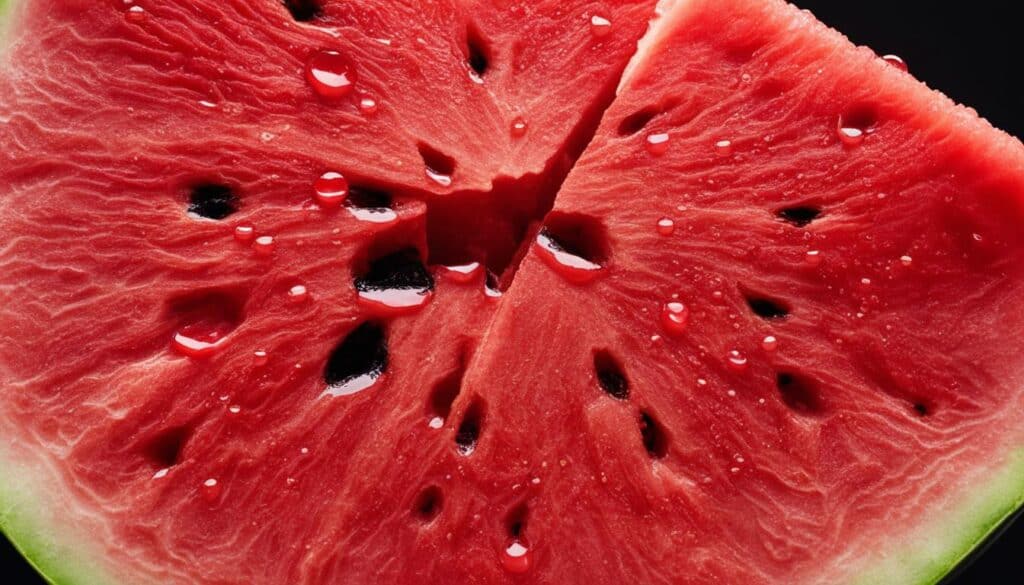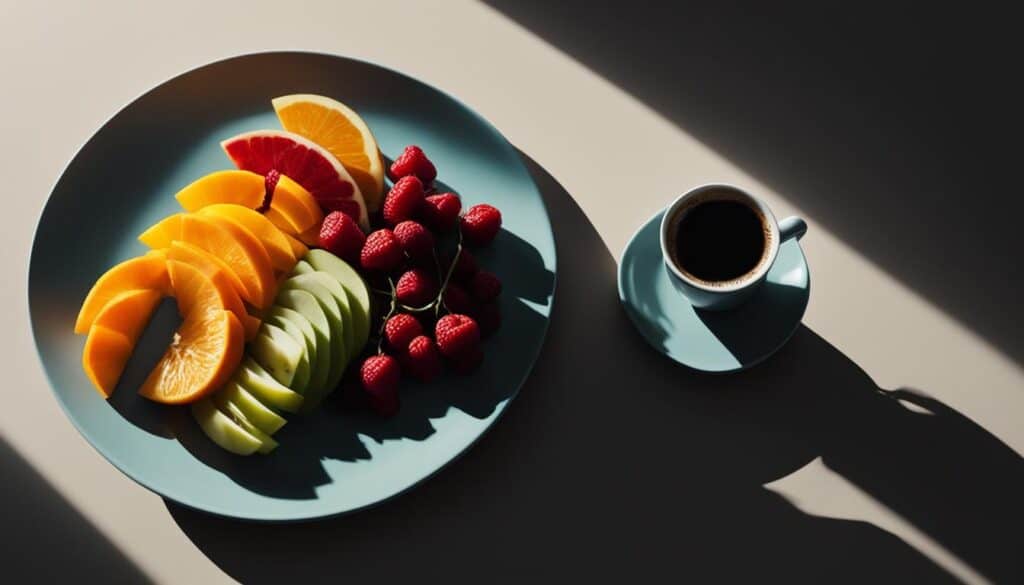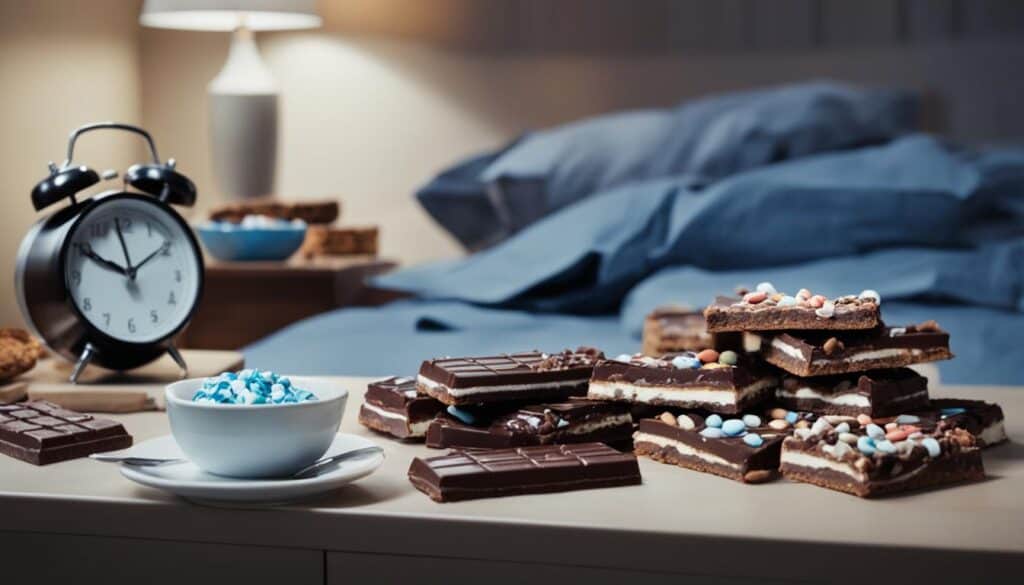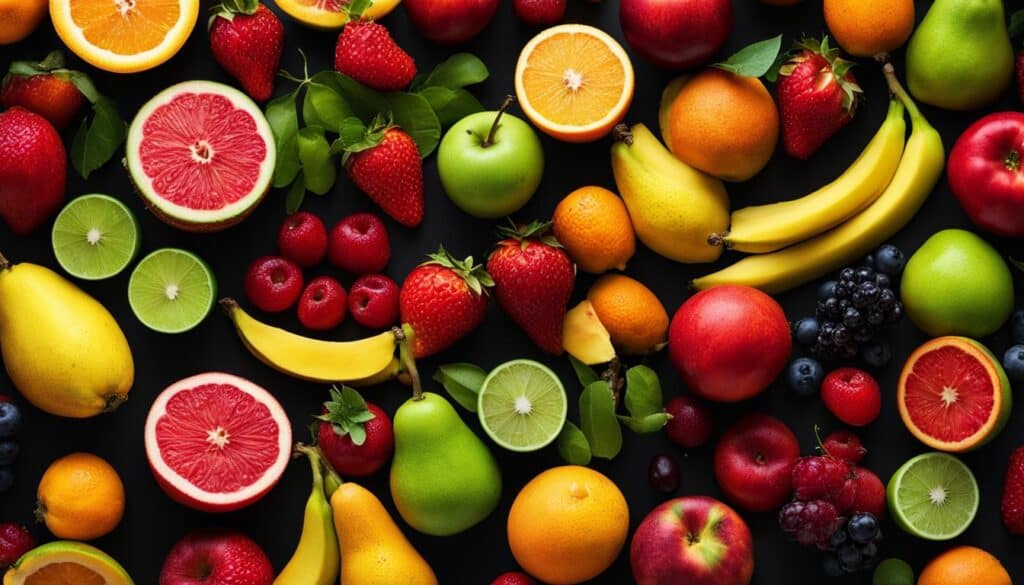When it comes to promoting a restful night’s sleep, it’s important to pay attention to your dietary choices. Certain fruits can disrupt your sleep quality if consumed before bedtime. These fruits are high in water content, sugar, or spice, which may lead to indigestion, heartburn, increased bathroom trips, and disrupted sleep patterns. By avoiding these fruits, you can improve your chances of a peaceful and uninterrupted night’s sleep.
Key Takeaways:
- Avoid fruits that are high in water content, sugar, or spice before bedtime.
- Consuming these fruits can lead to indigestion, heartburn, and disrupted sleep patterns.
- Opt for healthier alternatives like oatmeal, whole-grain toast, milk, cheese, cherries, and bananas.
- Listen to your body and make choices that support a peaceful sleep.
- Promote better sleep by excluding these fruits from your night-time diet.
Alcohol
When it comes to promoting a restful night’s sleep, it’s important to consider the impact of alcohol on sleep quality. While a nightcap may initially seem like a good idea, consuming alcohol before bedtime can actually disrupt your sleep cycle and hinder your overall sleep quality.
Alcohol is known to interfere with the natural sleep process, particularly the restorative REM sleep. This can lead to a shallow and fragmented sleep, leaving you feeling tired and groggy the next day. Additionally, alcohol can worsen conditions such as sleep apnea and acid reflux, further complicating your sleep patterns.
While it’s true that alcohol can make you feel drowsy and help you fall asleep faster, it ultimately compromises the quality of your sleep. It can also lead to more frequent bathroom trips during the night, interrupting your sleep. Therefore, it’s recommended to avoid consuming alcohol, especially in excess, before going to bed to ensure a more restful and rejuvenating night’s sleep.
Instead of relying on alcohol to induce sleep, consider alternative relaxation techniques such as reading a book, practicing meditation, or enjoying a warm cup of herbal tea. These activities can help prepare your body and mind for a good night’s sleep without the negative effects of alcohol.
Remember, the key to a truly restorative and high-quality sleep lies in making mindful choices about what you consume before bedtime. By avoiding alcohol, you can set yourself up for a more rejuvenating and refreshing sleep experience.
Heavy Foods
When it comes to promoting a restful night’s sleep, it’s important to be mindful of what you eat before bedtime. Heavy, fatty, and fried foods can take longer to digest, leading to indigestion and discomfort that can interfere with your sleep quality. Consuming foods like cheeseburgers, fries, fried foods, and large steaks late in the day can put a strain on your digestive system, making it harder for your body to relax and enter a deep sleep state.
Avoiding heavy foods before bed is crucial to ensure a peaceful and uninterrupted night’s sleep. Instead, opt for lighter, easily digestible options that won’t disrupt your sleep patterns. This includes incorporating a variety of fruits into your evening diet, but it’s important to note that there are some fruits that are best avoided before going to bed.
By making smart choices and excluding heavy foods from your night-time diet, you can improve digestion, minimize discomfort, and enhance the quality of your sleep.
| Fruits to Exclude from Your Night-Time Diet | Why to Avoid |
|---|---|
| Avocado | High in fat, which can lead to indigestion |
| Pineapple | Contains bromelain, an enzyme that may cause digestive issues |
| Coconut | High in fat and may lead to indigestion |
| Olives | High in fat and sodium, which can disrupt sleep |
While these fruits offer various health benefits and can be enjoyed as part of a balanced diet, consuming them before bedtime may not be ideal. It’s best to consume these fruits earlier in the day or during a meal to allow for proper digestion before settling down for sleep.
Foods with High Water Content
When it comes to choosing the right fruits to include in your night-time diet, it’s important to consider their water content. While staying hydrated is crucial for overall health, consuming fruits with high water content before bedtime can lead to frequent bathroom trips and disrupt your sleep. Fruits like celery, watermelon, and cucumbers are refreshing and hydrating choices, but they are best avoided in the evening to minimize sleep interruptions.
While fruits with high water content offer many health benefits, their diuretic properties can increase urine production and make you more prone to waking up during the night to use the bathroom. This interrupted sleep can lead to feeling groggy and tired the next day, affecting your overall well-being.

By excluding fruits with high water content from your night-time diet, you can promote better sleep and ensure a restful night’s rest. Instead, focus on consuming these hydrating fruits earlier in the day to reap their nutritional benefits without compromising your sleep quality.
Hydrating Fruits to Enjoy Throughout the Day:
- Strawberries
- Grapes
- Pineapple
- Peaches
- Oranges
These fruits provide essential vitamins, minerals, and fiber while keeping you properly hydrated during the day without causing sleep disruptions. Remember, it’s all about finding the right balance to support your well-being and overall sleep quality.
Foods with Hidden Caffeine
When it comes to promoting a restful night’s sleep, it’s not just coffee or energy drinks that can disrupt your slumber. Many common foods contain hidden caffeine that can act as stimulants, making it more difficult to fall asleep and decreasing the amount of restorative REM sleep you get.
Some examples of foods with hidden caffeine include:
- Tea
- Soda
- Ice cream
- Chocolate
Caffeine is a central nervous system stimulant that can interfere with sleep by blocking sleep-inducing chemicals in the brain and increasing alertness. Consuming these caffeinated foods before bedtime can disrupt your sleep patterns and leave you feeling restless and groggy the next day.
To promote better sleep, it’s important to check nutrition labels and avoid foods with caffeine, especially in the evening. Opt for decaffeinated versions of your favorite beverages and be cautious of hidden sources of caffeine in unexpected foods. By prioritizing a caffeine-free diet before bed, you’ll be setting yourself up for a more restful and rejuvenating sleep.

Super Sugary Treats
When it comes to bedtime snacks, it’s important to choose wisely, especially when it comes to sugary treats. Foods high in sugar, such as sugary cereals, desserts, and candy, may be tempting, but they can have a negative impact on your sleep quality.
Consuming these super sugary treats before bedtime can cause blood sugar spikes followed by crashes. This roller coaster effect can lead to restlessness and disrupted sleep, making it harder for you to fall asleep and stay asleep throughout the night.
To maintain stable blood sugar levels and promote better sleep, it’s best to avoid overly sugary treats before bed. Instead, opt for healthier options that won’t cause drastic fluctuations in your blood sugar levels. For a sweet and satisfying bedtime snack, consider having a small bowl of fresh berries or a slice of whole-grain toast with a spread of almond butter.

By making conscious choices and opting for less sugary alternatives, you can enjoy a more restful and rejuvenating night’s sleep.
Tyramine-Rich Foods
If you’re looking to get a good night’s sleep, it’s important to watch out for tyramine-rich foods. These fruits are best avoided before going to bed as they can interfere with sleep quality.
Tyramine is an amino acid that stimulates brain activity, making it more challenging to fall asleep. By excluding these fruits from your night-time diet, you can promote better sleep and wake up feeling refreshed.
- Tomatoes
- Soy sauce
- Eggplant
- Red wine
- Aged cheeses
These tyramine-rich foods can lead to increased brain activity and make it more difficult to achieve a restful sleep. To ensure a peaceful night’s rest, it’s best to avoid consuming these fruits in the evening.

Continue reading to learn more about the impact of other foods on sleep quality.
Spicy Foods
When it comes to promoting a good night’s sleep, the food choices we make can have a significant impact. Spicy foods, in particular, can interfere with our ability to fall asleep and stay asleep throughout the night. Consuming spicy foods before bedtime can cause heartburn and increase body temperature, making it more difficult to relax and drift off to sleep.
Spicy foods can cause heartburn and increase body temperature, making it more difficult to fall asleep.
Spicy foods contain compounds like capsaicin, which can irritate the lining of the stomach and lead to acid reflux or indigestion. This discomfort can disrupt sleep and leave us feeling restless throughout the night.
If you enjoy spicy foods, it’s best to consume them earlier in the day, such as at breakfast or lunch, rather than at dinner or before bedtime. This allows your body enough time to digest the spiciness and mitigate any discomfort before you hit the sack.
| Spicy Foods | Alternative Choices |
|---|---|
| Curry dishes | Grilled chicken with vegetables |
| Salsa and spicy dips | Guacamole with whole-grain chips |
| Spicy noodles or stir-fries | Pasta with marinara sauce and lean meat |
By enjoying spicy foods earlier in the day, you can prevent sleep disruption and discomfort, allowing for a more restful night’s sleep.
Remember, everyone is different, and some people may be more sensitive to spicy foods than others. It’s important to listen to your body and make choices that promote a peaceful sleep.
Conclusion
Making mindful choices about the fruits I consume before bedtime has significantly impacted my sleep quality. By avoiding fruits that are high in water content, sugar, or spice, I have been able to minimize discomfort, indigestion, frequent bathroom trips, and disrupted sleep patterns. Instead, I have opted for healthier alternatives like oatmeal, whole-grain toast, milk, cheese, and fruits like cherries and bananas. These choices have not only promoted better sleep but have also contributed to a more restful night’s rest.
Listening to my body and making choices that support a peaceful sleep has been key. Tonight, I won’t be reaching for the fruits to avoid eating at night, such as citrus fruits, berries, or pineapples, which can cause heartburn and acid reflux. Instead, I’ll opt for fruits that are sleep-friendly, like bananas, which contain magnesium and potassium that help relax the muscles.
It’s important to remember that promoting better sleep through dietary choices goes beyond just fruits. By also avoiding alcohol, heavy and fatty foods, foods with hidden caffeine, super sugary treats, tyramine-rich foods, and spicy foods, I can further enhance my sleep quality. Taking a holistic approach to my nighttime diet has made a noticeable difference in the quality of my sleep, leaving me feeling refreshed and rejuvenated in the mornings.
FAQ
Which fruits should I avoid eating at night?
Fruits that are high in water content, sugar, or spice are best avoided before bedtime. These fruits include watermelon, cucumber, and tomatoes.
Why should I avoid alcohol before bedtime?
Alcohol can negatively impact sleep quality by disrupting the natural sleep cycle, decreasing restorative REM sleep, and worsening conditions like sleep apnea and acid reflux.
How do heavy foods affect sleep quality?
Heavy, fatty, and fried foods can take longer to digest, leading to indigestion and discomfort that can interfere with your sleep.
Do foods with high water content affect sleep?
Yes, foods like celery, watermelon, and cucumbers can lead to increased bathroom trips during the night, disrupting your sleep.
Do foods with hidden caffeine disrupt sleep?
Yes, foods like tea, soda, ice cream, and chocolate can act as stimulants, making it more difficult to fall asleep and decreasing the amount of restorative REM sleep.
How do super sugary treats affect sleep?
Foods high in sugar can cause blood sugar spikes followed by crashes, leading to restlessness and disrupted sleep.
Are tyramine-rich foods bad for sleep?
Yes, tyramine-rich foods like tomatoes, soy sauce, and red wine can stimulate brain activity and make it more challenging to fall asleep.
Do spicy foods interfere with sleep?
Yes, spicy foods can cause heartburn and increase body temperature, making it more difficult to fall asleep.
How can I promote better sleep through dietary choices?
By avoiding fruits that are high in water content, sugar, or spice before bedtime and opting for healthier alternatives, like oatmeal, whole-grain toast, milk, cheese, cherries, and bananas, you can improve your sleep quality.





Leave a Reply